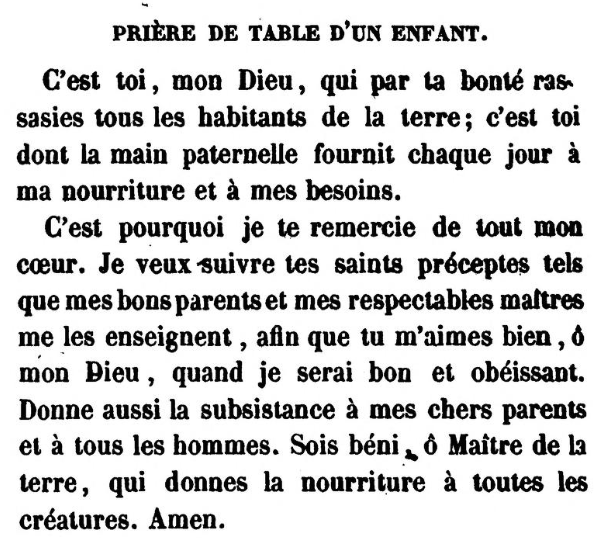| Source (French) | Translation (English) |
|---|---|
Bénissons la Toute-Puissance Qui sur nous verse, chaque jour, Les trésors de sa bienfaisance Et les trésors de son amour! Oubliant de notre âme impure Les travers et l’iniquité, Il ne punit sa créature Qu’en la camblant de sa bonté. Gloire au Roi de la nature, Gloire à son éternité! |
Let us bless the Almighty Who pours upon us, every day, The treasures of his beneficence And the treasures of his love! Forgetting our impure soul The crookedness and iniquity, He punishes his creature By showering it with his goodness. Glory to the King of nature, Glory to his eternity! |
Béni soit le Dieu secourable Qui pourvoit à tous nos besoins, Il appelle à sainte Table Ses enfants heureux de ses soins. Celui qui blasphème ou murmure Contre sa divine équité, Doit sa vie et sa nourriture A son immense charité. Gloire au Roi de la nature, Gloire à son éternité! |
Blessed be the helpful God Who provides for all our needs, He calls to his holy table His children happy with his care. He who blasphemes or murmurs Against his divine equity, Owes his life and his food To his immense charity. Glory to the King of nature, Glory to his eternity! |
Bénissez-nous, Dieu de lumière Eloignez de nous les malheurs, Et sur notre famille entière Répandez vos saintes faveurs. Que la vertu, que la droiture, Inspire notre volonté, Et que notre voix tendre et pure Longtemps s’écrie avec gaîté. Gloire au Roi de la nature, Gloire à son éternité! |
Bless us, God of light Take away from us the misfortunes, And on our whole family Pour out your holy favors. May virtue, may righteousness Inspire our will, And may our tender and pure voice Long cry out with gaiety. Glory to the King of nature, Glory to his eternity! |
הוֹדוּ לַיְיָ כִּי־טוֹב. כִּי לְעוֹלָם חַסְדּוֹ׃ (תהלים קלו:א) |
Give thanks to YHVH for he is beneficent, for his lovingkindness endures forever. (Psalms 136:1) |
Bénissons is a French adaptation of the table song, Bendigamos, a hymn sung after meals according to the custom of Western Sepharadim, Jews who found refuge from the Inquisition of the Iberian Peninsula in occidental lands. It is similar in meaning to the Birkat Hamazon (Blessing after Meals). Bendigamos is said in addition to Birkat Hamazon, usually immediately after it. The text was contributed by the pioneering French pedagogue David Lévi Alvarès to the collection of songs of the Jewish-Portuguese community of Paris: Hymnes sacrées à l’usage des Israélites français, composées sur les airs hébraïques-portugais les plus connus (1825). (We have had difficulty locating a copy of this work. If you have access to, or own a copy, please contact us.) The text here is as found in “Les Juifs espagnols de Saint-Esprit” by Henry Léon in in Annales de la Faculte des Lettres de Bordeaux: Bulletin Hispanique (Tome IX, 1907), p.282 — where it is compared with Bendigamos.
Bénissons/Bendigamos probably originated among the Sepharadim who settled in Bordeaux, a Hispanophone rather than Lusophone community. (Find below, a recording of Bénissons — with thanks to the Jewish Community of Bordeaux.) From France, Bendigamos was probably brought to the Dutch West-Indies island of Curaçao in the mid-nineteenth century and from there brought to New York, Amsterdam, and some other Western Sepharadi communities. Alternatively, the song may have originated with Sepharadi Jews living in Spain, who then immigrated to Turkey, other locales in the Ottoman Empire, and the Netherlands. It may originally have been written as a secret way to say the Birkat HaMazon after practicing Judaism in Spain and Portugal was forbidden in the fifteenth century.
English translation of the French by Aharon Varady. (“Who can know all one’s flaws? From hidden errors, correct me.” — Psalms 19:!3)
Recording(s)
Source(s)


“Bénissons, a French table song for the Birkat haMazon (ca. 18th c.)” is shared through the Open Siddur Project with a Creative Commons Attribution-ShareAlike 4.0 International copyleft license.









Leave a Reply